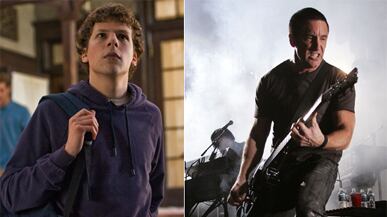On the surface, there are perhaps more obvious choices to score a film based on an Aaron Sorkin script about the advent of Facebook than Trent Reznor. After all, he's a rocker famous for songs like "Head Like A Hole," a producer whose best-known protégé is Marilyn Manson, and a one-time paramour of Courtney Love, with whom Reznor has sparred in the press on and off for the better part of a decade. What musical insight could the Nine Inch Nails front man possibly have into a couple of geeks from Harvard who invented the world's most successful social networking site?

Even Reznor admits that when the film's director, David Fincher, approached him about scoring the film a couple years back, he demurred. For one, he was burnt out after a grueling concert tour. For another, he'd just gotten married and made a promise to his new wife to take some time off. And the rocker, 45, really wasn't feeling terribly secure that he was the best man for the job.
"I love David Fincher and I think he's a genius," says Reznor, who worked with Fincher several years ago when Fincher was still directing music videos, which is how he made a name for himself. "It was a great opportunity to dip my toes into something new, but I lacked the confidence to take it on. So I said no. Then I called him a couple months later and said ‘I want to apologize, and keep me in mind in the future if things come up.' And as it turned out, this was still available. So it worked out well for me."
ADVERTISEMENT
This, it would seem, is something of an understatement. Already, Reznor has a Golden Globe on his mantle for the trippy, ambient inspired score, and by most accounts, there's an Oscar coming too on February 27, regardless of whether The King's Speech takes home the biggest trophy of the night.
For Reznor, the trick was in realizing that The Social Network was less about a website, and more about alienation and isolation, two things he's pretty familiar with. "We had Aaron Sorkin's language—he uses words beautifully," says Michael de Luca, one of the the film's producers. "But Trent's music was the beating heart of the movie's subconscious, the stuff that can't be expressed in words, the pauses and the looks on the actors' faces. That's where the score came in and really spoke up."
"There was a voice in me when I was younger, it wasn't an act, it wasn't a character, it was just my journal turned into music," Reznor says.
"For me, The Social Network isn't about Facebook," Reznor says. "It certainly isn't about how people use it. It's about a flawed character and his pursuit of that grand idea that defines him and validates his life and how far he'll go to get it, and the repercussions that come as a result of that—what he gives up in the process. And those are themes I could relate to."
He continues: "At its worst, the movie could have turned into a courtroom drama. I personally felt the music needed some weight, some darkness. The themes that resonated with me were ones of bitterness and isolation. The character of Mark Zuckerbeg wanted to be accepted, wanted to leave a mark, wanted to do something epic and would do anything to achieve it, and placed that goal far above personal relationships, friendship, trust. I felt it needed to be detached and icy."
Another thing Reznor particularly liked about doing the movie was that it came at a time when he felt some need to reinvent himself. In 2001, he went to rehab and got sober; in the coming years, hardcore workouts and a stable, adult relationship replaced getting high. At some point, he began to realize that, when it came to his own doom and gloom, the well was beginning to run dry.
It's a problem many musicians face when the pain and angst give way to contented middle age. "There was a voice in me when I was younger, it wasn't an act, it wasn't a character, it was just my journal turned into music," Reznor says. "I didn't know what else to say. I was going to explode based on rage and anger. But a lot of the things I felt at that time, that's not who I am now. I know that person. There're parts of him in there still, but if I tried to write The Downward Spiral [NIN's seminal album] now, I'm guessing that it would feel very insincere."
He goes on to note that he's currently producing music for his wife, Mariqueen Mandig, and as he puts it, "It's as much for me as it is for her. I don't want to box myself into a corner, and NIN is primarily about a certain voice and perspective that I have to make sure is still relevant to me. I like stepping out of the limelight, and when Mariqueen and I started talking about music, I actually found we had a lot of common ground."
Plus which, Fincher seems determined to keep him busy. Beyond his duties promoting The Social Network, Reznor is now in preproduction scoring music for The Girl With The Dragon Tattoo, which, of course, is another movie centered around an emotionally disconnected, sometime computer hacker. And this time, some trippy, dark music won't be remotely incongruous with the main character's black leather jackets, body ink, and heavy eyeliner, which Reznor himself once wore so shamelessly.
Reznor and Fincher have even been discussing the possibility of doing a Broadway musical adapted from Fight Club, the Fincher film based on Chuck Paluchniak's novel. "[David] asked me how I felt about it," Reznor recalls, "and I told him I thought that could be the worst idea I'd ever heard, until he explained what he was looking for: Something avant-garde, some modern, groundbreaking thing. Now, I'd love to see that come to life…"
Jacob Bernstein is a senior reporter at The Daily Beast. He has also written for New York magazine, Paper, and The Huffington Post.






